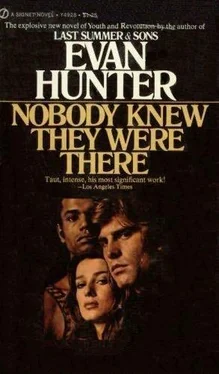Evan Hunter - Nobody Knew They Were There
Здесь есть возможность читать онлайн «Evan Hunter - Nobody Knew They Were There» весь текст электронной книги совершенно бесплатно (целиком полную версию без сокращений). В некоторых случаях можно слушать аудио, скачать через торрент в формате fb2 и присутствует краткое содержание. Город: New York, Год выпуска: 1971, ISBN: 1971, Издательство: Doubleday & Company, Жанр: Проза, на английском языке. Описание произведения, (предисловие) а так же отзывы посетителей доступны на портале библиотеки ЛибКат.
- Название:Nobody Knew They Were There
- Автор:
- Издательство:Doubleday & Company
- Жанр:
- Год:1971
- Город:New York
- ISBN:978-0094575004
- Рейтинг книги:4 / 5. Голосов: 1
-
Избранное:Добавить в избранное
- Отзывы:
-
Ваша оценка:
- 80
- 1
- 2
- 3
- 4
- 5
Nobody Knew They Were There: краткое содержание, описание и аннотация
Предлагаем к чтению аннотацию, описание, краткое содержание или предисловие (зависит от того, что написал сам автор книги «Nobody Knew They Were There»). Если вы не нашли необходимую информацию о книге — напишите в комментариях, мы постараемся отыскать её.
Nobody Knew They Were There — читать онлайн бесплатно полную книгу (весь текст) целиком
Ниже представлен текст книги, разбитый по страницам. Система сохранения места последней прочитанной страницы, позволяет с удобством читать онлайн бесплатно книгу «Nobody Knew They Were There», без необходимости каждый раз заново искать на чём Вы остановились. Поставьте закладку, и сможете в любой момент перейти на страницу, на которой закончили чтение.
Интервал:
Закладка:
I look at my watch. It is almost six o’clock — eight in the East. I place the call to Eugene’s apartment in Manhattan. He tells me that he is on his way out to dinner, in fact has his hat and coat on.
“Is it snowing there?” he asks.
“It snowed yesterday.”
“It’s snowing here now,” he says. “Cold as hell, too.”
“It’s sixteen above here,” I tell him. “Did you reach David?”
“Yes. But not at his apartment.”
“Where then?”
“He’s home. With Abby.” Eugene hesitates. “If you don’t mind my saying so, Sam, that’s where you should be, too.”
“Yes, well, thank you for your advice. What did David say?”
“He’s planning to leave for Denmark with his friend.”
“When?”
“Before the case comes up.”
“Has a date been set for the trial?”
“November fifth.”
“Is his friend definitely jumping bail?”
“Yes.”
“Has he got a passport?”
“He was in Europe last summer with his parents. He’s got a passport”
“Did you try to talk David out of it?”
“I did. But I’m not his father. I think you’d better call him yourself.”
“I don’t want to get into another long conversation with Abby.”
“She’s your wife, you’ve got to talk to her. Do you want your son running all over Europe with a kid who’s wanted by the police?”
“Of course not”
“Then take my advice, Sam…” he begins, and says something else but I cannot hear him clearly because the bells start again at that moment, tolling the hour.
“What did you say?”
“What the hell was that? ” Eugene asks.
“The bell tower.”
“Sounds like it’s right in your room.”
“Yeah. What were you saying, Eugene?”
“I was saying take my advice and come home.” He hesitates. “You lost one son, Sam. Don’t lose another.”
I do not answer for a moment “Sam?” he says.
“I’m here.”
“Will you come home?”
“No.”
“Why not?”
“Because I lost one son, and I don’t want to lose another.”
“You’re not making sense, Sam.”
“I’m making a lot of sense, Eugene.”
“Will you call Abby?”
“I’m not sure,” I say, and hang up.
It is a much brisker walk than Seth promised, these seven blocks from the hotel to his apartment. The sidewalks have been shoveled clear and spread with ashes in many spots, but the walking is for the most part slippery and treacherous and there is a cruel biting wind that relentlessly attacks the face. I clutch against my chest a brown paper bag containing the fresh bottle of scotch I bought, my other hand in the pocket of my coat, my head ducked, my eyes tearing. I am hoping it will not be this cold on the morning the train arrives. I am beginning to realize that November second is only a week away, and I have not even begun inquiries yet as to how I can get the explosives I will need.
The building is a small two-story clapboard structure with a shoveled path leading to a tiny roofed front porch. A curtainless picture window fills almost the entire front side of the lower story, illuminating the snow-covered front yard and revealing a roomful of people inside. I do not see Sara among them. I am suddenly tempted to go back to the hotel and drink myself into a solitary stupor.
There are leaves on the front porch, huddled in the corners as though protecting themselves from the bitter cold. I search for a bell or a knocker, but there is none. The upper half of the front door consists of a pane of glass set into the wood and curtained from within. I try the knob and the door opens. A narrow flight of steps leads to the second story of the building. The steps are dark and seem as steep as my ravine. To the right of the steps, there is another door. I knock on it, and wait, and then knock again, and then enter.
The first person I see is my follower.
He is wearing blue jeans and boots and a tan shirt with pointed pocket flaps. He is sitting on the piano bench and smiling. A blond girl is sitting beside him, one slender hand on the keyboard of the old upright My follower looks me directly in the eye, but he does not stop smiling. There is music coming from the record player, and the blonde says, “Here, listen, it’s coming up, right here,” her head cocked toward the record player as she strikes a chord, and my follower chuckles and nods, and says, “Yes, indeed, that’s it,” and he does not take his eyes from my face. Seth Wilson appears at my elbow.
“Hello, Mr. Sachs,” he says. “I’m glad you could make it.”
“I brought scotch,” I say stupidly, and exhibit the brown paper bag.
“Oh, that’s fine,” Seth says. “Why don’t you just put it in the kitchen, Mr. Sachs?”
I nod. There are perhaps a dozen people in the room, but I am aware only of my follower. Seth gently takes my elbow and leads me through the doorway into the kitchen.
“Can I take your coat, Mr. Sachs?” he says.
“Yes. Thank you. Yes.”
I put the bottle on the kitchen table. It is crowded with beer bottles, I notice, and I begin to think I’ve committed a social error by bringing hard whiskey. The truth is, being forty-two years old, I am not invited to very many B.Y.O. parties. I take off my coat and hand it to Seth. He moves perhaps three steps to his left, and throws the coat through an open doorway, hopefully onto a bed. There are six or seven people in the small kitchen, most of them young, one of them a man slightly older than I, with a middle-aged paunch and a Chinaman’s beard. He is in deep conversation with a tall brunette in a short red dress and a floppy pink hat. Sara is not in the kitchen. The clock on the wall reads nine-thirty.
“Fix yourself a drink, why don’t you?” Seth says. “Then I’ll introduce you around.”
“Thank you.” I put two ice cubes into a large water glass, and fill it with scotch. I take a deep swallow. Then I take another one. From where I am standing near the kitchen table, I can see into the other room, but not to where the piano is. Seth is watching me. He is wearing the smile he wore the day Sara introduced us. Stupidly, I look at my watch.
“She’ll be here,” he says, “don’t worry.”
He takes me into the other room. There is a momentary silence as we enter, and I feel awkward and uncomfortable, but only until a new record drops into place, and there is music again, the rock-and-roll stuff Adam used to play day and night, the stuff David still plays constantly. The blonde laughs. In a lumpy easy chair near the front window, I see Epstein sitting, still wearing the hounds-tooth jacket and gray slacks he wore at Professor Raines’s house. Seth has my elbow. He is leading me toward the piano. The blonde stops laughing.
“Lucille,” Seth says, “this is Arthur Sachs.”
“Hello, Arthur,” she says. She is perhaps twenty years old. She is wearing a tan suede skirt, and her long legs are sheathed in dark brown tights.
“And this is Davey,” Seth says, and my follower grins and extends his hand to me.
“That’s my son’s name,” I tell him. I have not yet taken his hand.
“Small world,” he says. His hand is still extended. It is a huge black hand with a pinkish palm.
“Small world,” I repeat, and I take his hand, and our eyes meet, and he is still smiling, and I am beginning to think I have made a mistake; perhaps he is not my follower, after all.
“I want another beer,” Lucille says, and rises abruptly. “Do you want a beer, Davey?”
“No, thank you, honey,” he says. We have terminated the handshake, but our eyes are still searching. The girl goes off into the kitchen where someone greets her in a loud voice. Seth goes across the room to talk to a black girl in a turtleneck shirt and faded jeans. Epstein is watching me from his easy chair, his hands folded across his chest. The window, backed by the blackness of the night outside, has become a large reflecting mirror. The room reverberates with voices.
Читать дальшеИнтервал:
Закладка:
Похожие книги на «Nobody Knew They Were There»
Представляем Вашему вниманию похожие книги на «Nobody Knew They Were There» списком для выбора. Мы отобрали схожую по названию и смыслу литературу в надежде предоставить читателям больше вариантов отыскать новые, интересные, ещё непрочитанные произведения.
Обсуждение, отзывы о книге «Nobody Knew They Were There» и просто собственные мнения читателей. Оставьте ваши комментарии, напишите, что Вы думаете о произведении, его смысле или главных героях. Укажите что конкретно понравилось, а что нет, и почему Вы так считаете.












